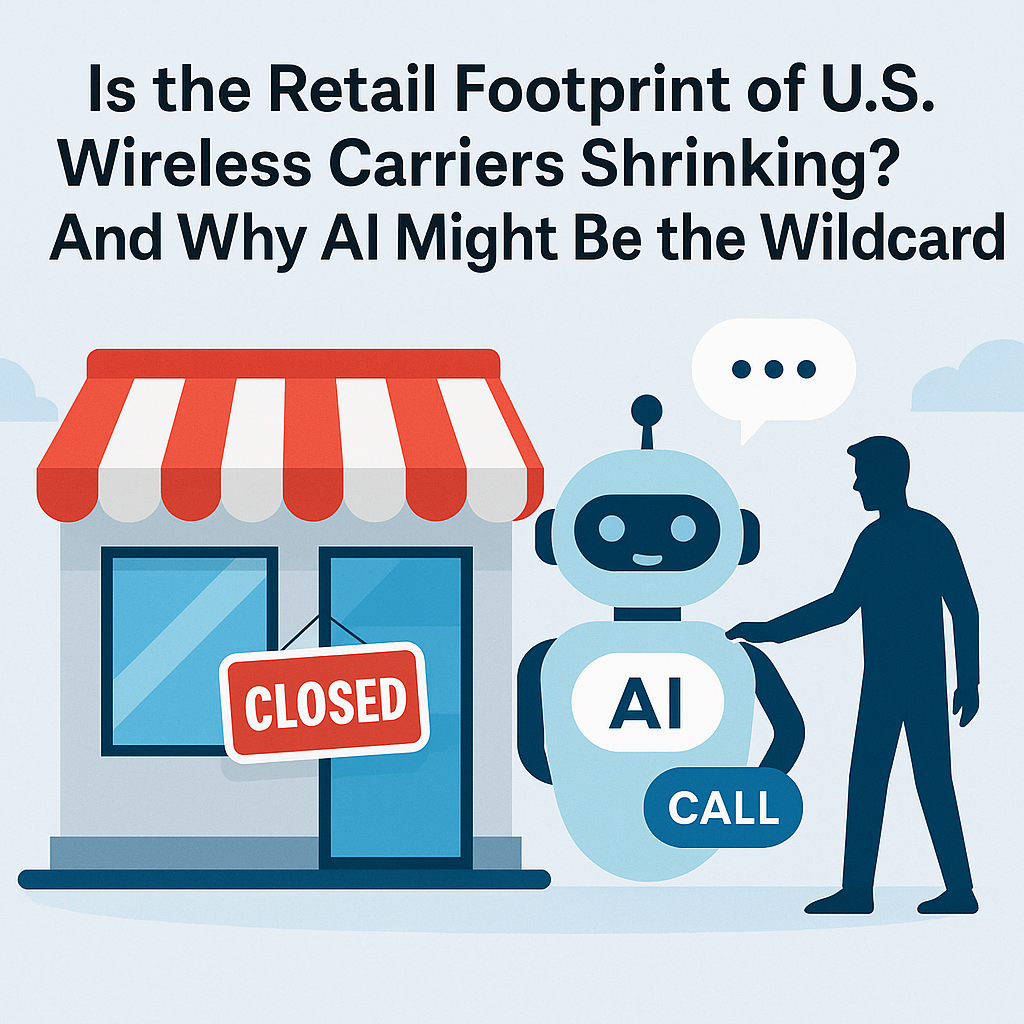
Table of Contents
Carrier Retail Is Shifting: What Verizon’s Rumored Store Closures—and T-Mobile Chatter—Mean for Customers, Partners, and AI-Driven Support
If you follow wireless retail, you’ve probably seen reports that Verizon may be preparing for layoffs and brick-and-mortar store closures as it doubles down on digital and AI-enabled customer service. While nothing has been officially confirmed, multiple credible industry sources point in the same direction. It’s worth unpacking what this means for customers, competitors, and reseller partners like 5Gstore.
Verizon’s AI Pivot and Retail Shake-Up
The buzz is that Verizon is planning to trim its retail footprint and workforce as part of a broader strategy to reduce costs and improve efficiency. This includes expanding its investment in AI tools designed to handle common customer service tasks. Verizon has already introduced new AI assistants capable of managing billing questions, plan changes, and troubleshooting—escalating to human agents only when necessary.
This marks a significant shift for a company that built its reputation on an extensive network of physical stores and in-person support. The transition toward digital-first interactions is meant to modernize service and streamline costs, but it also raises questions about how customers will respond if they feel that human touch is fading.
T-Mobile’s Rumored Retail Changes
T-Mobile is facing similar speculation about potential store reductions. In recent years, the company has closed several flagship “Signature” stores and encouraged customers to rely more heavily on its app and digital channels. While there’s no formal announcement of widespread closures, industry chatter suggests the brand is re-evaluating how many physical stores it truly needs.
This isn’t new—since merging with Sprint, T-Mobile has worked to optimize its retail presence by consolidating overlapping locations and improving efficiency. Still, the trend is clear: carriers are investing more in digital tools and less in traditional storefronts.
The Scale of Carrier Retail Today
Even with possible closures, the big three carriers maintain thousands of locations across the U.S. Verizon operates roughly 6,800 stores (including authorized retailers), T-Mobile about 6,000, and AT&T just under that. Metro by T-Mobile adds thousands more in the prepaid category.
Over the past five years, the overall number of corporate-owned stores has declined slightly, while authorized reseller locations have grown. The shift isn’t about abandoning retail altogether—it’s about rebalancing toward lower-cost, higher-efficiency channels.
Why AI Is the Wildcard
AI-driven customer service is improving quickly. Modern systems can now interpret natural language, recognize customer intent, and resolve common issues around the clock. Carriers see enormous potential to reduce hold times and staffing costs while improving availability.
The risk? When AI misses the mark, customers notice. Frustration builds when a chatbot can’t understand a complex issue or refuses to transfer a call to a real person. That kind of experience can erode brand loyalty overnight.
If a carrier uses AI to enhance service—offering speed, convenience, and fast handoff to humans—it can strengthen its customer relationships. But if it hides behind AI as a cost-cutting measure, it risks a backlash that could send frustrated users flocking to competitors like AT&T, which could benefit from positioning itself as the “human-first” alternative.
What This Means for Customers
- Fewer walk-in options: If some stores close, the nearest physical support center might be an authorized retailer instead of a corporate store.
- More digital service: Most routine tasks—like billing questions, SIM activations, and plan changes—will continue moving into apps and AI chat systems.
- Importance of escalation: Knowing how to reach a real support agent will matter more than ever.
- Evaluate the full experience: When choosing a carrier, factor in both performance and the quality of support—human or otherwise.
What This Means for Reseller Partners and 5Gstore Customers
- Higher demand for expertise: As carriers lean on automation, customers will look for human experts who can explain complex networking solutions, failover options, and hardware configurations.
- Growth in open-market equipment: Businesses may prefer unlocked routers, antennas, and failover solutions that aren’t tied to a single carrier or locked service model.
- Greater reliance on monitoring tools: When it’s harder to reach a human at a carrier, visibility becomes essential. Platforms like RouterStatus.net, which integrate multiple vendors’ APIs, can fill that gap.
- AI as a tool, not a replacement: At 5Gstore, we use AI to enhance—not replace—our human support. AI can assist with pattern recognition and diagnostics, but real people still handle the judgment calls that matter.
Forecast: The Next 12–24 Months
- Retail footprints will shrink modestly: Expect carriers to close overlapping or low-performing stores while maintaining presence in key metro areas.
- Authorized resellers will gain importance: Corporate locations may decline, but the overall network will stay dense through partnerships.
- AI will handle the “front door” for most interactions: Expect chatbots and digital assistants to become the default starting point.
- Customer experience will define winners and losers: The carriers that blend automation with empathy will thrive. Those that don’t may see an exodus of customers seeking better service elsewhere.
5Gstore Take
Carrier retail is evolving—from physical spaces to digital pathways. AI will increasingly handle the first interaction, while humans remain essential for complex or relationship-driven needs. If carriers strike the right balance, everyone wins. If they don’t, customers will leave in droves—and those who value quality service will look to companies like 5Gstore and AT&T for reliability, responsiveness, and expertise.
At 5Gstore, we’ll continue combining advanced technology with human support to help businesses stay connected, protected, and ready for whatever comes next. Reach out to 5Gstore if you have any questions.

